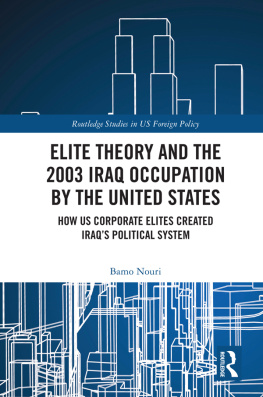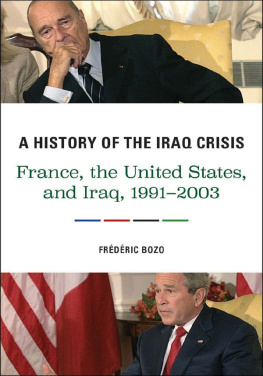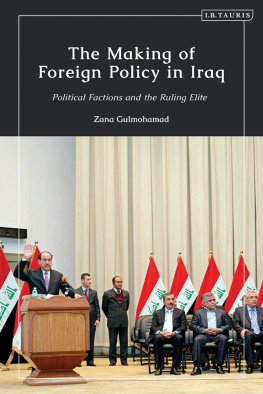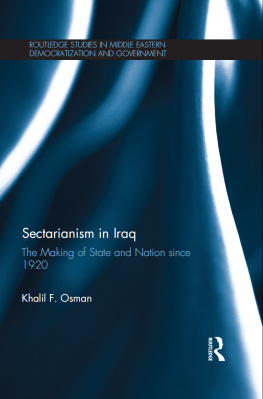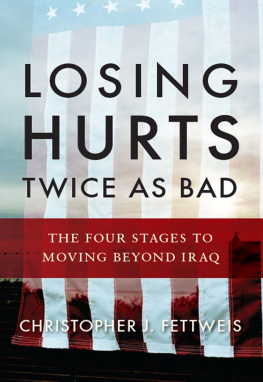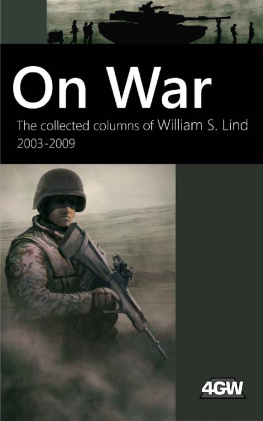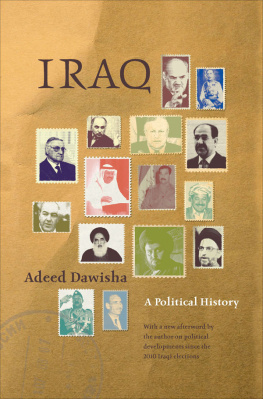Elite Theory and the 2003 Iraq Occupation by the United States
This book locates US elites as members of corporate elite networks and drivers of corporate elite interests, arguing that studying the social sources of US power plays an important part in understanding the nature of their decisions in US foreign policy.
Exploring the decisions taken by American elites on the Iraq War, the author argues that the decisions and agendas US elites pursued in Iraq were driven by corporate elite interests embedded in them as individuals and in groups through the corporate elite networks they were rooted in which they prioritised, using democracy promotion as a cover up. Using elite theory, membership network analysis and content analysis, this book explains who these elites were, how their backgrounds and social influences impacted their world-views and what this looked like in a detailed exploration of their decision-making on the ground in Iraq. Nouri examines the nature of US power, what drives it, what it looks like and its legacies.
This volume provides valuable understandings and lessons to scholars and students of International Relations studying democracy, US foreign policy, post-colonialism, elite theory, US imperialism, neoliberalism, orientalism, Iraqi politics and the making of the Iraq constitution.
Bamo Nouri is a lecturer in International Relations at the University of West London, an Honorary Research Fellow at City, University of London, an independent investigative journalist and writer with interests in American foreign policy and the international and domestic politics of the Middle East.
Routledge Studies in US Foreign Policy
Series Editors:
Inderjeet Parmar, City University, and John Dumbrell, University of Durham
This new series sets out to publish high-quality works by leading and emerging scholars critically engaging with United States Foreign Policy. The series welcomes a variety of approaches to the subject and draws on scholarship from international relations, security studies, international political economy, foreign policy analysis and contemporary international history.
Subjects covered include the role of administrations and institutions, the media, think tanks, ideologues and intellectuals, elites, transnational corporations, public opinion, and pressure groups in shaping foreign policy, US relations with individual nations, with global regions and global institutions and Americas evolving strategic and military policies.
The series aims to provide a range of books from individual research monographs and edited collections to textbooks and supplemental reading for scholars, researchers, policy analysts and students.
North Korea US Relations
From Kim Jong-il to Kim Jong-un (2nd edition)
Ramon Pacheco Pardo
Economic Statecraft and US Foreign Policy
Reducing the Demand for Violence
Leif Rosenberger
US Policy towards Afghanistan, 19792014
A Force for Good
Anthony Teitler
Elite Theory and the 2003 Iraq Occupation by the United States
How US Corporate Elites Created Iraqs Political System
Bamo Nouri
For more information about this series, please visit: www.routledge.com/series/RSUSFP
Elite Theory and the 2003 Iraq Occupation by the United States
How US Corporate Elites Created Iraqs Political System
Bamo Nouri
First published 2022
by Routledge
2 Park Square, Milton Park, Abingdon, Oxon OX14 4RN
and by Routledge
605 Third Avenue, New York, NY 10158
Routledge is an imprint of the Taylor & Francis Group, an informa business
2022 Bamo Nouri
The right of Bamo Nouri to be identified as author of this work has been asserted by him in accordance with sections 77 and 78 of the Copyright, Designs and Patents Act 1988.
All rights reserved. No part of this book may be reprinted or reproduced or utilised in any form or by any electronic, mechanical, or other means, now known or hereafter invented, including photocopying and recording, or in any information storage or retrieval system, without permission in writing from the publishers.
Trademark notice: Product or corporate names may be trademarks or registered trademarks, and are used only for identification and explanation without intent to infringe.
British Library Cataloguing-in-Publication Data
A catalogue record for this book is available from the British Library
Library of Congress Cataloging-in-Publication Data
Names: Nouri, Bamo, author.
Title: Elite theory and the 2003 Iraq occupation by the United States:
how US corporate elites created Iraqs political system / Bamo Nouri.
Description: New York: Routledge, 2021. |
Series: Routledge studies in US foreign policy |
Includes bibliographical references and index.
Identifiers: LCCN 2021005903 (print) | LCCN 2021005904 (ebook) |
ISBN 9780367706913 (hardback) | ISBN 9780367706920 (paperback) |
ISBN 9781003147558 (ebook)
Subjects: LCSH: IraqPolitics and government2003 |
United StatesForeign relationsIraq. | IraqForeign relationsUnited States. |
DemocratizationIraqHistory21st century. | PrivatizationIraq. |
Elite (Social sciences)United States. | Elite (Social sciences)Iraq.
Classification: LCC DS79.769 .N68 2021 (print) |
LCC DS79.769 (ebook) | DDC 956.7044/31dc23
LC record available at https://lccn.loc.gov/2021005903
LC ebook record available at https://lccn.loc.gov/2021005904
ISBN: 978-0-367-70691-3 (hbk)
ISBN: 978-0-367-70692-0 (pbk)
ISBN: 978-1-003-14755-8 (ebk)
DOI: 10.4324/9781003147558
Typeset in Times New Roman
by Newgen Publishing UK
Contents
First and foremost, all praise is due to God almighty who gave me the faith, strength and belief to persevere and succeed without God nothing is possible.
This book emerged from a PhD journey that was never about acknowledgement, praise or credentials, instead, it was a personal quest for the truth on behalf of the 40 million Iraqis who suffered immeasurably in the Iraq War. I must thank and praise my incredible parents both such unimaginable forces who have steered and supported me thoroughly on my quest for knowledge and justice. Firstly, I will mention the role of my incredible rock of a mother, Kwestan. She graduated from the University of Baghdad with a degree in Law in 1988 her stories of the great united days of Iraq have been so moving in sparking my desire to pursue this journey. I must state unequivocally that my mother being a perpetual symbol of justice, faith and purity has shaped every positive decision I have ever made I cannot put into words how influential you are and will always be Mum is the word!
I want to also acknowledge my amazing father, Bahadin, a cultured Architect who graduated with an MA in Architecture and Town Planning from Ion Mincu University of Architecture and Urbanism, Bucharest, has been and always will be a formidable presence in my life. Despite being a graduate of Architecture, being a first-generation immigrant meant he had to sacrificially pursue avenues of business and construction to make sure me and my siblings reached prosperous destinations. He is a true architect with a limitless imagination, who has choreographed ways for great achievements to be made possible he is arguably the most powerful influence on my imagination and creativity. His fathering style (books over toys) has always involved developing me and my siblings intellectually from as far back as I remember this has remained consistent until today when I am writing this acknowledgement. My father made it his personal quest to source the majority of the books that were consolidated for this volume. His relentless journeys physically and online to get hold of the knowledge that would advance my inquisitions have been immeasurable thank you Dad. Both my parents sacrificed themselves without question for their children and without them I would not be where I am today.

